Wall Street to the Power Five? How former CEO Joe Moglia emerged as Coastal Carolina's innovative coach
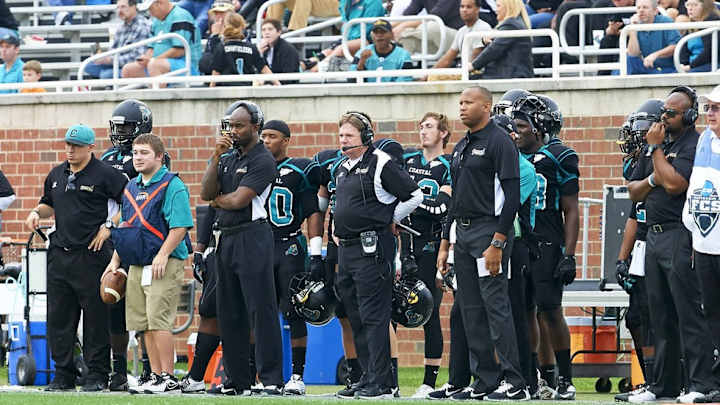
CONWAY, S.C.—Giovanni Giuseppe Moglia immigrated to New York from Italy at age 8 in 1927, fought in World War II and met the woman of his dreams while on furlough in Ireland. He wrote Frances McLarnon passionate letters for two years before finally asking her father's permission for her to come to the United States and marry him. During the couple's years of courtship, McLarnon's family gleaned a few things about Moglia. They knew he ran his own business, and the return address on his envelope read 4535 Park Avenue in New York. So, as Moglia family legend goes, the McLarnon family in Ireland thought his offer was too good to pass up—even if he was Italian.
Frances's new address turned out to be a two-bedroom apartment in the Bronx overlooking an industrial railroad area. (Park Avenue runs from Manhattan up through the Bronx.) Moglia also glossed over the fact that he lived with his mother and three siblings. His business turned out to be a fruit stand. McLarnon summarized her new life in a letter to her parents two months after her arrival: "I have no idea why the Americans make such a big deal out of Park Avenue."
That gritty address hatched one of America's quintessential immigrant stories. Joseph Moglia, the oldest of Giovanni and Frances's five children, went from running with street gangs in the Inwood neighborhood of Manhattan to engineering one of the most successful CEO runs in recent American history. Moglia turned TD Ameritrade from a company with $24 billion in client assets into a $280 billion juggernaut, which gave shareholders a 500% return on investment. He did so after coaching high school and college football until he was 34, when he left to work on Wall Street to support his four children.
Along the way, Moglia made hundreds of millions of dollars. When he stepped down at the top of his profession at age 60 in 2009, Moglia added a unique twist to his take on the American dream. He decided to become a football coach again, working as an assistant at Nebraska for two seasons before being hired as the head coach at Coastal Carolina in December 2011. The combination of Moglia's CEO background and football savvy has elevated remote Coastal Carolina from good to great, as it spent eight weeks this season ranked No. 1 in the Football Championship Subdivision. "My story is 10 times better than the Rudy story," Moglia says. "Rudy's a tough kid in the city, Chicago kid that wanted to go to Notre Dame. That's it."
Moglia hasn't just become a top-flight coach; he has done so by using an approach antithetical to modern football convention. Coastal rarely hits, other than during scrimmages or games. Backups get as many reps as starters, and Moglia rarely speaks during practice. He stresses teaching so much that players are given learning tests in order to be taught more effectively. "I'm a better football coach because I was a CEO," Moglia says, "and I was a better CEO because I was a football coach."
Coastal (9–1) visits Liberty (5–5) in its regular-season finale on Thursday. (The game will be broadcast on ESPNews.) The Chanticleers are ranked No. 4 in the FCS and are in strong position to contend for a national title. But a bigger question looms large. With roughly 15 college football head coaching jobs expected to open in Power Five conferences this year, will the 66-year-old Moglia get a chance to coach at the sport's highest level? Could a downtrodden program such as Rutgers, Virginia or Syracuse hoping to upgrade its football address from the Bronx to Manhattan hire someone who has made a similar move?
When asked if Moglia can succeed at the highest level of coaching, those who know him best don't waver. Of course he can, because it's impossible to imagine Moglia failing.
"We've bought a lot of businesses over the last 60 years," Berkshire Hathaway CEO Warren Buffett says. "I don't give guys an IQ test or look at their grades. I look for passion, there's nothing like it. You want someone ready to bite the ass off a bear. You can't put that into people. Guys like Joe who have that passion come out winning."
*****
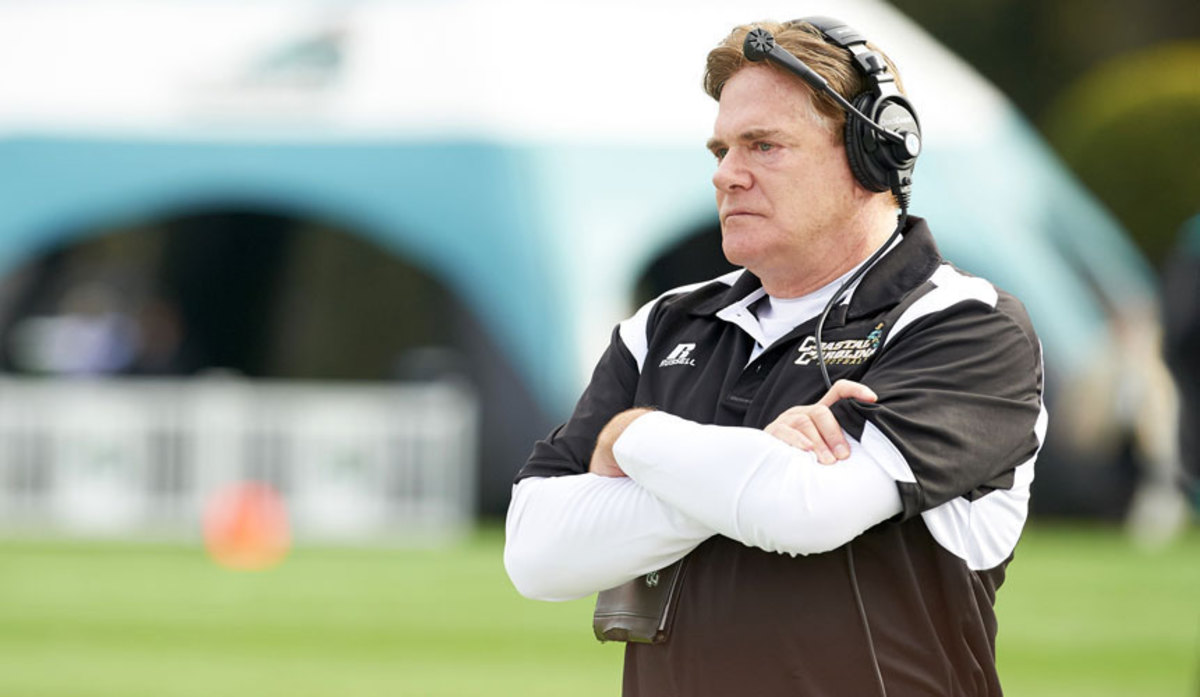
Jason Smith/SI
Moglia stands in silence 21 rows above the teal-colored field as the cacophony of the Coastal Carolina's football practice unfolds beneath him. A few miles from the neon blur of Myrtle Beach's firework shacks, seafood buffets and outlet malls, the Chanticleers play on a field appropriately nicknamed the Surf Turf.
Every few minutes, Moglia opens a small notebook and jots down observations to bring up in staff meetings. He pays attention to players' effort, execution and technique from up above. But of primary importance to Moglia is enhancing the singular quality that made him such an effective CEO—efficiency.
In essence, Moglia took his experience maximizing a large corporate organization and applied it to football. Instead of instilling a workaholic culture, Moglia insists his staffers maximize their time and are able to get home every night and see their families. In practice, Moglia figured out a way to get players many more snaps while leaving them at decreased risk of injury. He also holds a religious fervor for special teams, which his program practices for a minimum of 30 minutes each day. In an era when spreading the field and ratcheting the tempo have sparked ingenuity, Moglia's innovation comes through structure and efficiency, both on the field and off it.
When Moglia first got to Coastal Carolina before the 2012 campaign, he couldn't understand why so many players stood around watching at practice. In theory, he thought, backups needed more practice reps than starters in an effort to help them develop. Yet reserves rarely received more than a quarter of the amount of practice snaps. And when backups did get reps, starters stood around doing nothing. "How many practices have I seen at big, major programs where you've got 30 guys standing on the sideline?" Moglia asks.
So, for all of Coastal Carolina's practices during spring and fall camp, starters and backups—ones and twos in football parlance—worked separately. This created logistical challenges, as the offensive coordinator couldn't oversee both groups. And if the receivers coach was overseeing the backups, he couldn't coach up the starters. Still, at Moglia's urging—"I seldom mandate, I guide," he likes to say—Coastal began regularly practicing this way in his second year at the helm. Despite being on the field less time, Coastal got in 40% more snaps. Injuries were cut in half, too, a result of eliminating hitting from more than 95% of practices.
Like most things involving Moglia, skeptics of his system soon became believers. Coaches realized the benefits of getting backups more snaps, especially in an FCS season that can stretch to 16 games with playoffs. "No question about it, one of his strengths is that he really knows how to run an organization," says Coastal offensive coordinator Dave Patenaude, "and put people in a place to be successful."
*****
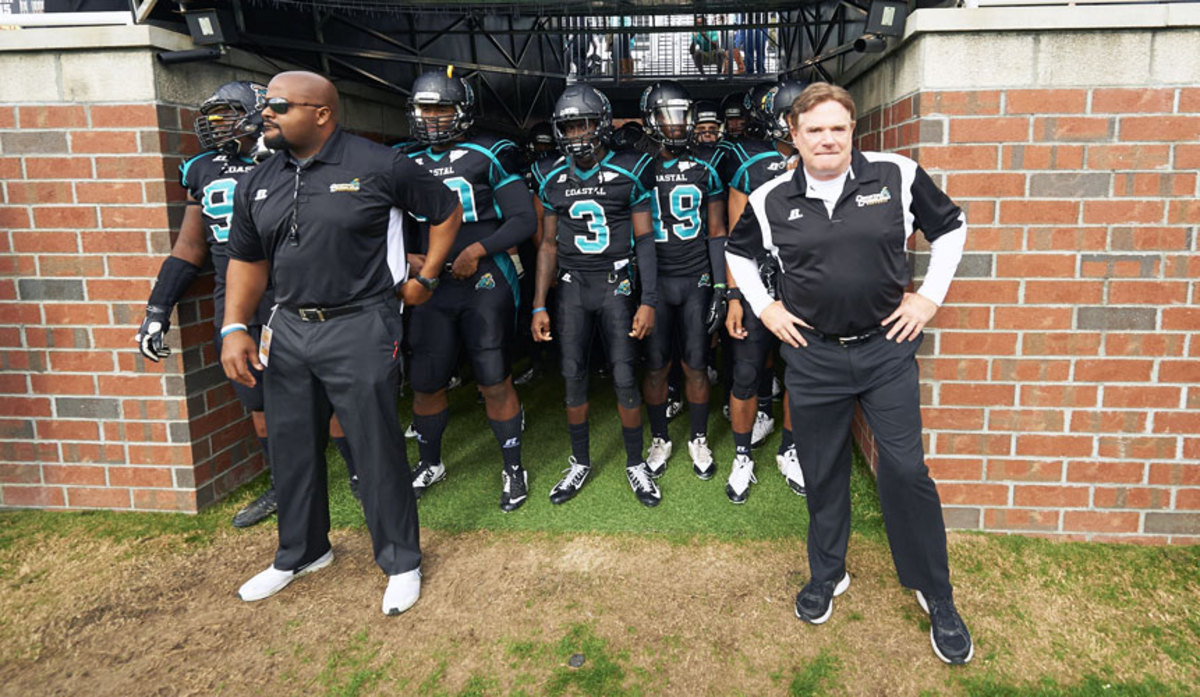
Jason Smith/SI
The crux of Moglia's coaching style lies in the way he guides his assistants. Moglia's background when he coached at Dartmouth from 1981-83 came on defense. (That's where he focused his time at Nebraska as well). So, his approach doesn't necessarily consist of him telling his receivers coach how to handle the slot position. But when he watched five-minute practice periods with the wideouts catching just one or two balls, he suggested redesigning the drill to use multiple throwers so players could triple their reps. This forced assistants to dial back on-field coaching, instead saving instruction and detail for teachable moments in film sessions. "He recognizes his limitations in expertise," says Patenaude. "Once his confidence level was developed, that's your area to run. He really understood, people have different expertise levels, and his success is built on based on how you utilize them."
While Moglia may not pick apart the offense's play-calling strategy, he remains passionate about teaching. All of his players are required to take a VAK learning test, so the coaches know if they're visual, audio or kinesthetic learners. Coaches should be aware if they should teach a specific player by acting out technique, drawing on a whiteboard or providing verbal instruction. Moglia doesn't want his assistants to tell him they explained something to a player who didn't get the message. It's incumbent on coaches to communicate their points more effectively. "That's our fault if a player doesn't understand something," Moglia says. "So, if he doesn't understand it, why doesn't he understand it? Coaches need to be great teachers."
Moglia's desire for efficiency transcends the field. In recruiting, many staffs spend hours reviewing film and debating the value of potential players. Moglia boils the process down to a simple A/B/C system. A-level prospects are guys Coastal would never want to play against. C-level prospects are guys they would love to see on the opposing sideline. Coaches aren't allowed to evaluate recruits together, nor can they know a player's star rating or list of scholarship offers. The time saved is immense: Rather than debating dozens of players for 10 minutes each, Moglia relies on two independent evaluations from his assistants. If a player receives a grade of B+ or better, then the position coach needs to sign off and the player will get recruited. "The speed with which you do this is incredible," Moglia says.
Moglia also doesn't have his staff go out and recruit high school games on Friday nights, as he'd prefer his assistants stay home with their families and be fresh for game days. The only night the staff members stay late—usually no longer than 9:30 p.m.—is on Sundays to prepare for the week. Coaches can leave work early to watch their kids' sporting events and show up a little late to drive them to school. They're allotted time to exercise. Moglia believes having fresh assistants poised to make good decisions trumps working long hours because the culture of the sport dictates it. And the coaches certainly appreciate the moderately normal lives they are able to lead. "The story is always the same story about Joe—millionaire coach makes good," says Patenaude. "To me, that's not even the story. This is a guy who has been successful at everything he's done. He's extremely smart and his life experience gives him a totally different outlook. We sit in this box and say, 'Here is football.' He's sitting in this bigger box of life."
When Moglia got hired, he was skewered for his lack of X's and O's acumen. Moglia is quick to point out that he has more than 20 years of coaching experience and has written a book, published in the early 1980s, titled The Perimeter Attack Offense. Yet Moglia's 39–6 record over the past 45 FCS games at Coastal is a result of a lot more than X's and O's knowledge.
"It's harder to do [what he has done] at Coastal Carolina than [at] a BCS school where you have more resources," says former Nebraska coach Bo Pelini, who Moglia worked under with the Cornhuskers for two years when he transitioned back to football in 2009. "History tends to repeat itself. Good or bad. All of his has been is good. He's smart enough to know what it takes to have success."
*****
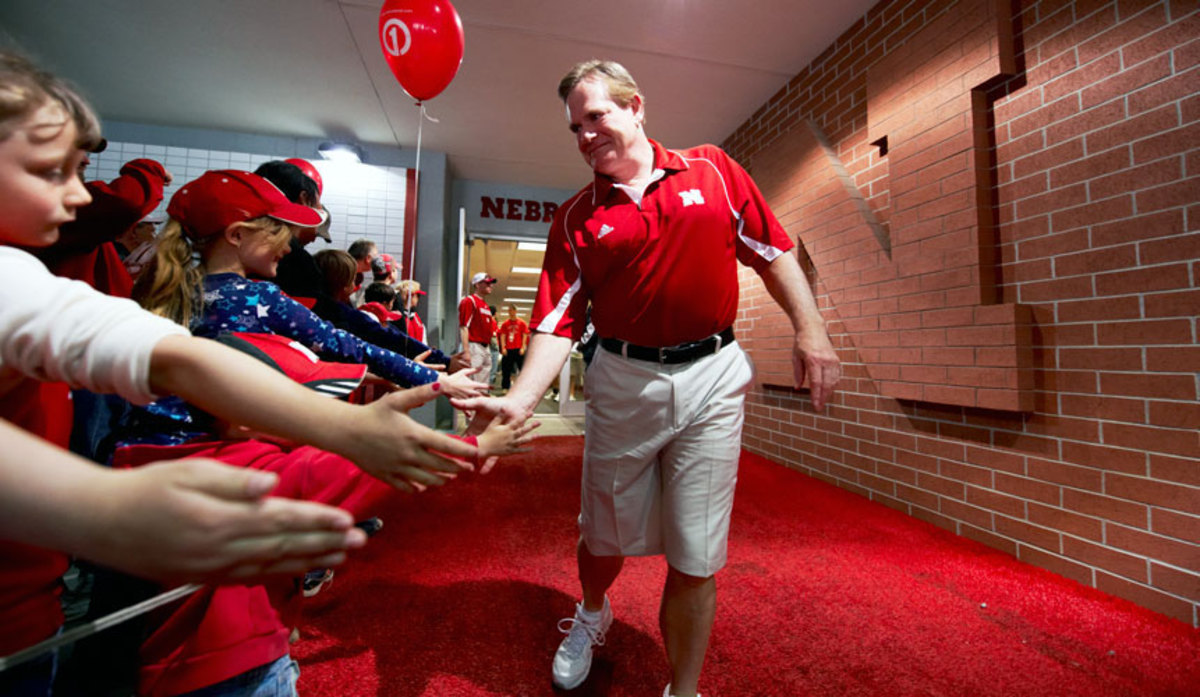
Bill Frakes/SI
The low point of Coastal Carolina's 2014 regular season came in the waning seconds of a 15–14 loss to unranked Liberty on Nov. 22. Alex Catron's last-second, 24-yard field goal attempt collided with a Liberty defender's armpit, and the missed kick cost Coastal, previously 11–0, the potential top seed in the FCS playoffs, which would have guaranteed it home-field advantage until the championship. Instead, the Chanticleers ended up as the No. 10 seed. They lost 39–32 at No. 2 North Dakota State in the quarterfinals.
Moglia harbors no hard feelings toward the kicker, but still shakes his head at the coaching breakdown that led to that moment. Throughout his career, Catron had a penchant for mentally faltering after missing a kick. So, Moglia and his staff had decided weeks earlier that as soon as he missed one, he'd be pulled from the game. Moglia is a fiery man who doesn't believe in emotional decisions; his philosophy is that most sideline decisions shouldn't be made in the approximately 25 seconds between plays that coaches have to make them. The missed kick infuriated Moglia because his assistants decided to stick with Catron after an earlier missed kick largely since he was a senior.
Emotion trumped the plan, the opposite of how Moglia runs his system. That one breakdown dashed home-field advantage and could have cost Coastal a shot at playing for the national title. "That will haunt me," Moglia says. "That decision was made. I shouldn't put my guys in that situation. I want them to be able to make a decision crisply when it gets emotional because we've already discussed it."
In many ways, Moglia still acts like a CEO. His quiet overseeing of practice, however, isn't an accurate indicator of how hands-on he truly is. At the head of the table in a conference room in Coastal's football facility, he looks at ease running the business of football. His notes are impeccably organized, with offensive, defensive and special team snaps and plays all broken down into an array of tables and charts. (Moglia is especially proud of the 15-yard average field position differential on kickoff and 12-yard average differential on punt returns. They equate to nearly 100 hidden yards per game.) Essentially, he studies and adjusts to the program's football trends in the same way he once reacted to stock market tendencies.
At one point last week, Moglia's reading glasses slid down to the end of his nose, giving him a look more common among finance professors than football autocrats. That's fitting, because his responsibilities cover the spectrum: He does everything from buzz through a list of players on the cusp of academic danger to critique the backup long snapper on film. He also takes part in a conference call with the chief of staff at TD Ameritrade, where Moglia is still chairman of the board and has duties that take up about five hours every month, and continues to brainstorm ways to improve team efficiency. For example, last Wednesday he asked his operations maven, George Glenn, to explore bringing in a pastor on Sunday morning to perform a service. It could save the assistants time they otherwise would spend going to church on a short week.
In meetings, Moglia ticks off agenda items authoritatively yet always remains open to suggestions. Despite his pace, a quote painted on the wall reveals his ethos: "The most dangerous phrase is the English language is, 'We've always done it this way.'"
*****
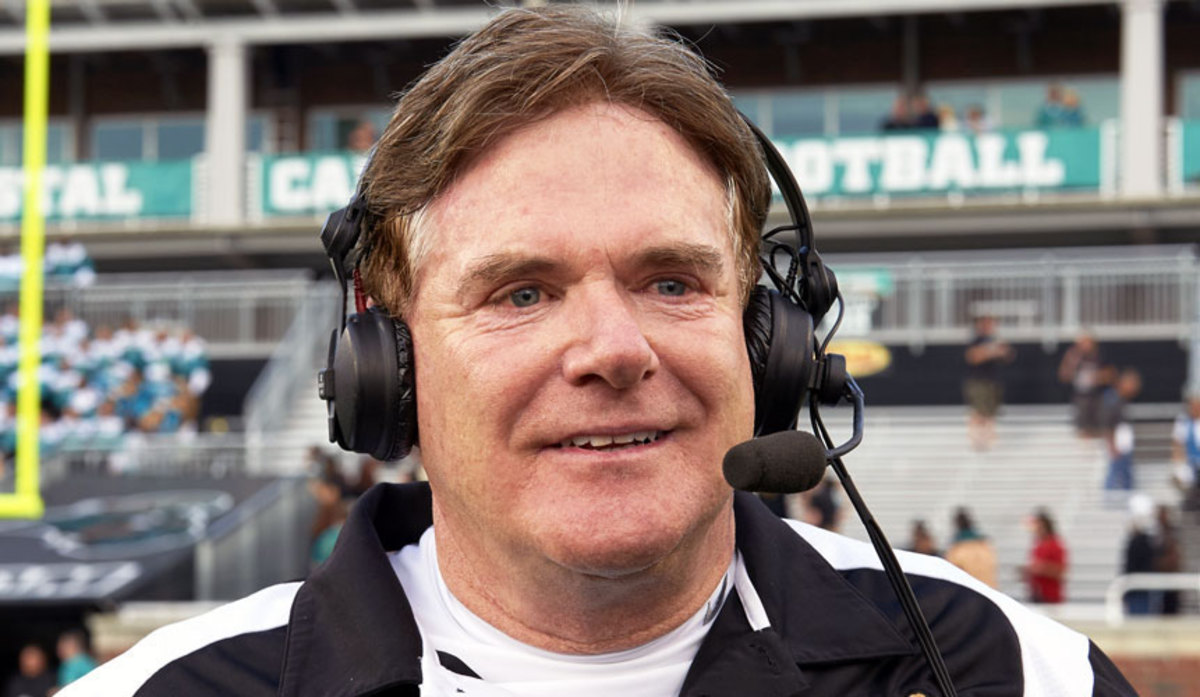
Jason Smith/SI
Coastal Carolina president David A. DeCenzno sits at a small table in his modest on-campus office and ponders a question that a handful of college presidents will face over the next few weeks: Can a 66-year former CEO worth hundreds of millions of dollars revitalize the football fortunes of a major program? "I think it would work anywhere," DeCenzno says. "I think it would work because of Joe Moglia. Could I or another person replicate it? I don't know."
The knocks against Moglia are obvious, and he's well aware of them. They start with his age, as there aren't many 66-year-old candidates. Experience will also be an issue. Both notions irk Pelini. "That's absurd," he says of Moglia. "He's able to put more into one day than the people hiring him would put into a week."
Moglia's biggest obstacle, though, will likely be convention, as presidents, search firms and athletic directors may not feel comfortable bringing in an outsider. Not everyone embraces the mantra about challenging the way things have always been done. In this case, the presidents and ADs considering Moglia would have to be self-assured enough to hire someone who could run their universities or departments better than they do.
"If a college president calls me about Joe, I'd tell him to do it," Buffett says. "There's a skepticism that exists when a guy hasn't been doing it his whole life. I don't know whether a president is calling and asking that question, but I would feel that Joe would not only help my kid hit his potential in football, he'd help him be successful in life. I would think he could run any top-notch football program."
Take a Management 101 class or skim through the Harvard Business Journal and it quickly becomes evident that any successful organization requires a clear vision and direction. What Moglia's four years at Coastal have allowed him to do is create and refine his BAM philosophy. The acronym stands for Be A Man, and it forces players, coaches and staffers to "stand on your own two feet" and "take responsibility for yourself," according to Moglia. BAM is a catchall for his ideals, and it includes the baseline vision of "No Rules, One Standard" and "putting a team on the field all of Coastal Carolina can be proud of." Moglia's real-world experience also prods him to give his players practical experience. Every week, he cuts practice short by half an hour for a Life After Football session. He'll talk to his roster about everything from the threat of ISIS to dealing with racism, or from the basics of fatherhood to money management. "Everyone who told these guys since they were a kid football is life, well, that's bulls***," he says. "Life is taking care of a sick child, your career path, losing your parents, losing a loved one, understanding world terrorism. That's life."
Moglia has a long list of coaches and administrators who vouch for his methods. Big 12 commissioner Bob Bowlsby, former Nebraska coach Tom Osborne and chairman of USA Basketball Jerry Colangelo all eagerly endorsed Moglia to SI. They also all harkened back to similar themes: the ability to lead, project a message, identify a strong staff and emphasize education. "It's a story that's unique, but when you think about it it's less remarkable," Bowlsby says of Moglia. "He's an expert at building high-performing organizations."
As Moglia flips through special teams film on his laptop in his office, CBNC plays on mute on a flat-screen television. Soon enough, when this bull coaching market hits, presidents and ADs will need to determine whether to judge Moglia through the prism of past performance or football convention. The decision could dictate which address on Park Avenue their program will reside on for years to come.
